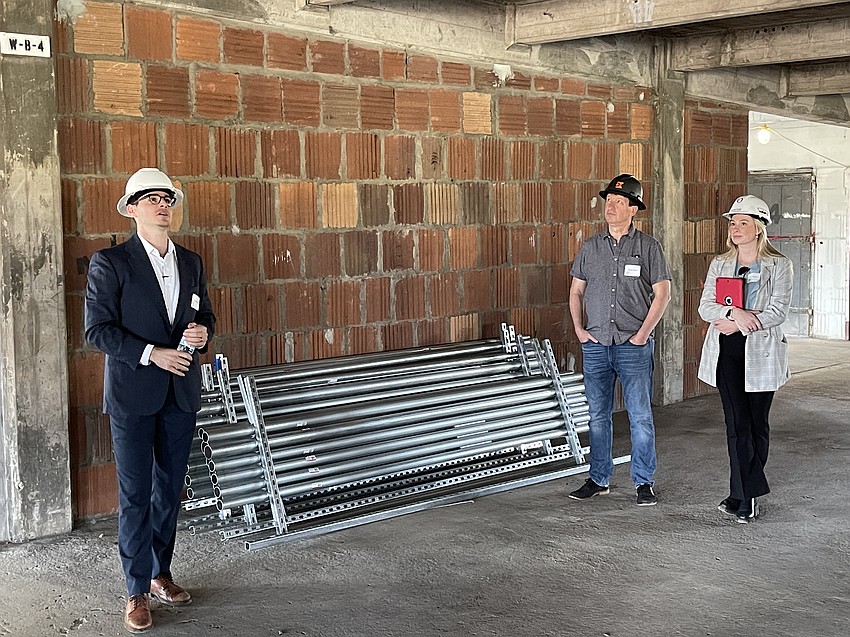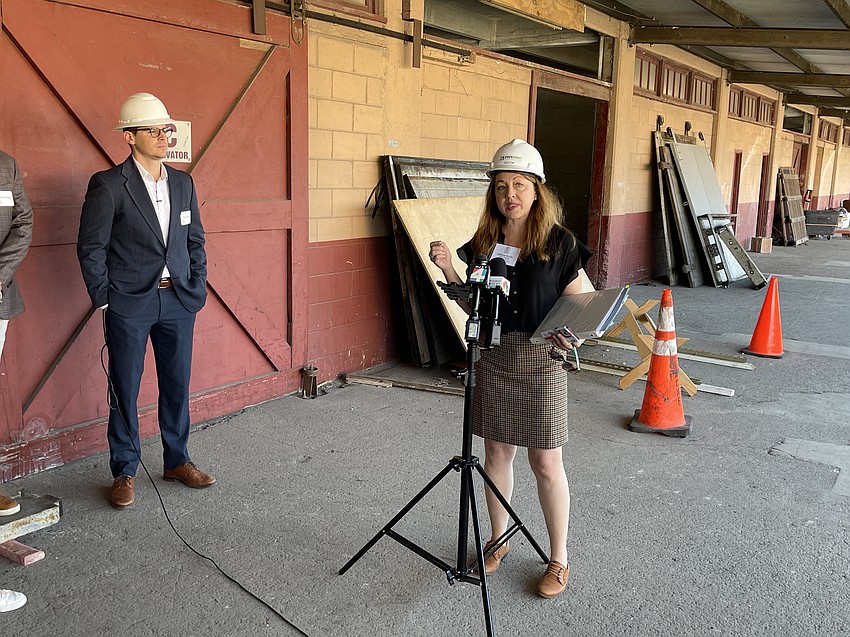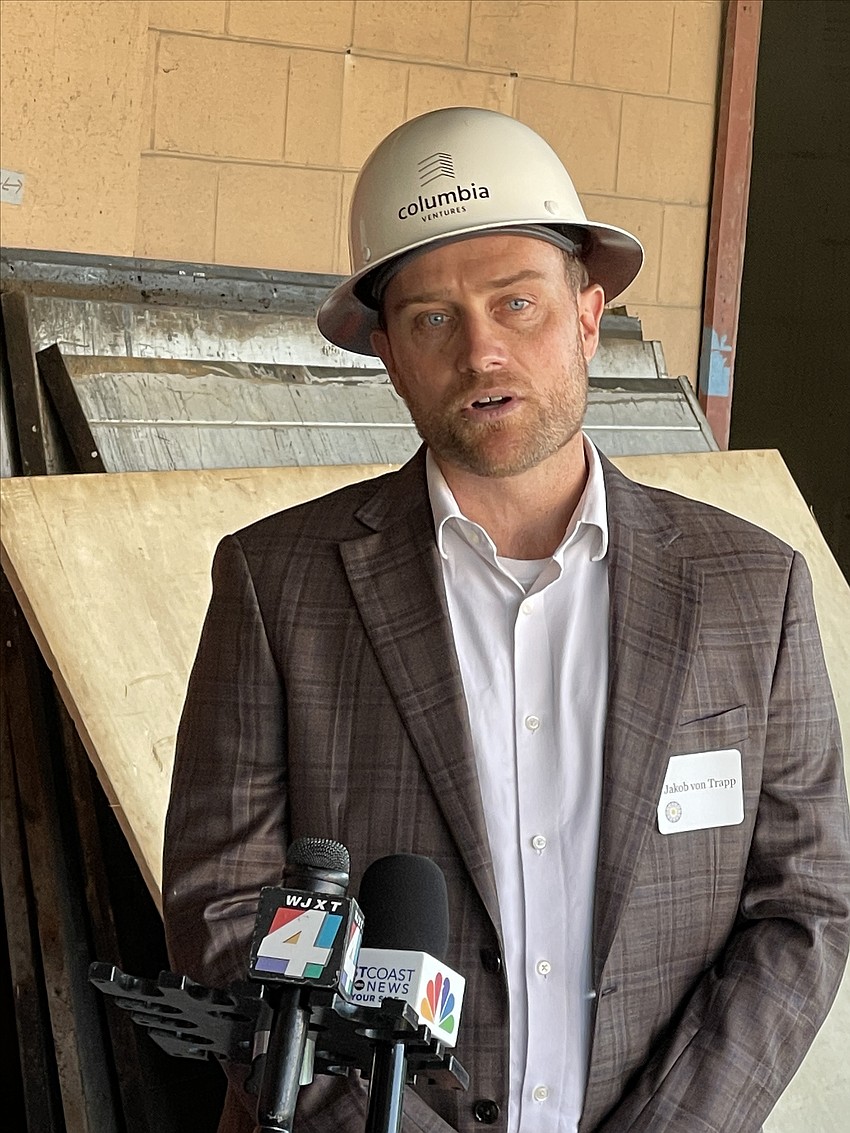Speaking to Florida lawmakers from the loading dock of the Union Terminal Warehouse on Jacksonville’s Eastside, Columbia Ventures LLC Development Manager Ryan Akin said the building’s $72 million mixed-use renovation will be a win for the neighborhood and local historic preservation.
“All right, I’m going to take you back in time a little bit,” Akin said.
The Atlanta-based developer coordinated the Feb. 27 tour with the Florida Trust for Historic Preservation, a statewide nonprofit that works to preserve Florida historical sites.
The groups hoped the Union Terminal project would be a showpiece as the Florida Legislature considers bills in the 2023 session that would create a state-level historic tax credit program to provide more financial incentives for preservation, restoration and adaptive reuse projects.
Columbia Ventures purchased the 110-year-old historic warehouse at 700 E. Union St. through an affiliate in December 2018 and started work in 2022 to preserve and convert it into mixed-income residential and commercial space.

Turner Construction Co. built Union Terminal Warehouse, once the largest commercial building in Florida, from 1912-13 after the Great Fire of 1901.
The four-story building is 330,000 square feet in size.
It allowed Florida to pioneer modern grocery distribution in the early 20th century and used the 50,000-gallon water tank on the roof as a marketing tool to show that tenants would be safe from fire, Akin said.
When complete, Union Terminal is designed to house 228 apartments, 44 commercial units and 11 maker/artist spaces, a restaurant and a coffee shop.
Akin and Columbia Ventures representatives told state officials that like the Union Terminal project bringing investment and jobs to Jacksonville’s Eastside and urban core, more access to financing could do the same for other underserved communities and historic structures throughout Florida.
“There is $72 million of capital that’s coming into this project. That’s transformative.” Akin said. “That helps ignite a spark in the neighborhood.”
Florida Secretary of State Cord Byrd; Sen. Tracie Davis, D-Jacksonville; Rep. Dean Black, R-Jacksonville; and House bill Sponsor Rep. Paula Stark, R-St. Cloud, attended the event with other state and city officials, area nonprofit leaders and Columbia Ventures development team.

Florida Trust CEO and President Melissa Wyllie said Florida House Bill 499 and the companion Senate Bill 288 would allow private developers to “marry” state tax credits with Federal Historic Preservation Tax Incentives through the National Park Service to fill gaps in project financing.
According to Wyllie, 37 U.S. states have statewide historic tax incentive programs.
Florida does not.
“We’ve seen in Florida there have been some projects like this that have been eligible for the state tax credit but they weren’t able to get those final numbers to work. They were just a little short,” Wyllie said.
“So this could really be the difference for a lot of those historic preservation projects throughout the state to make it a reality,” she said.
What is in the bills
HB 499 and SB 288 were filed Jan. 24 and Jan. 19, respectively.
They would provide a tax credit of up to 20% of total eligible rehabilitation costs of a certified historic structure through an application process.
If the building is in a certified Florida Main Street Community, the developer could qualify for a tax credit of up to 30% of the eligible costs.
To be eligible, the property has to be listed individually on the National Register of Historic Places or deemed a contributing structure to the district by the Florida Division of Historical Resources and the National Park Service.
To receive public financing for a historic preservation project in Florida, a developer can apply for federal tax credits or search for city incentive programs.
The developer must have an ownership interest in the structure to receive the tax credits.
State and federal regulators will determine whether the project is eligible for the incentives.
The trust says without a statewide historic tax program, Florida “deprives communities of the economic benefit” brought by restoration projects.
“Preserving your sense of place can be a really important piece to your redevelopment plans. It makes you different from other places,” Wyllie said.
Sen. Nick DiCeglie, R-St. Petersburg, is sponsoring the Senate bill.
The legislative session starts March 7.
Difficult to finance
According to Columbia Ventures, $30.5 million of the total project cost will bring Union Terminal up to code, preserved and ready to repurpose.

Jakob Von Trapp, Columbia Ventures co-founder and partner, said costs related to concrete restoration, historic window and roof replacements can make historic preservation projects more expensive than new construction.
Columbia Ventures covered about $17.5 million of those expenses through city incentives and federal tax credits, Von Trapp said.
In May 2022, City Council authorized $8.29 million in forgivable and deferred principal loans in May for the project through the Downtown Investment Authority’s Downtown Preservation and Revitalization Program.
Duval County Clerk of Courts records show that Bank United of Miami Lakes issued a $41.35 million mortgage in August 2022 to the Columbia Ventures subsidiary that owns the warehouse.
Von Trapp said Columbia Ventures had the capital to cover the difference, but not all private developers can make that level of equity investment for historic projects.
“Really, the impetus of this tour is there’s an opportunity right now before you to pass a statewide initiative that can allow other municipalities, rural, suburban, urban, across the state to have a fighting chance to save buildings like this,” Von Trapp said
Keeping it original
Columbia Ventures plans to keep as many of the original elements of the building as possible. Akin said steel fire doors will be kept in place and reused in the residential hallway corridors.
The water tower will be restored and remain as part of a 3,000-square-foot rooftop terrace.
Tour participants used the building’s original freight elevator Feb. 27.
Columbia Ventures is coordinating with Groundwork Jacksonville, the nonprofit lead of the Emerald Trail project, to allow the 30-mile path to run through “subway” tunnels once used for rail freight loading.
Akin said the tunnels will be a connection on the trail between Springfield and the Downtown Sports Complex.
Suzanne Pickett, president of the nonprofit Historic Eastside Community Development Corporation, said Columbia Venture’s Union Terminal project is the first large-scale investment in the neighborhood in five decades.
Pickett is also board vice chair of LIFT JAX, a group of business and community leaders working to eradicate generational poverty in Jacksonville and active in Eastside revitalization.
Columbia Ventures says there will be about 200 construction workers on-site daily at peak construction with 368,000 worker hours over 22 months.
Akin said the first three subcontractors hired for the project were part of the city’s Jacksonville Small and Emerging Business program.
The project is scheduled to be completed in summer 2024.
About 191 of the 228 residential units will be leased to people making at or below 100% of the area median income, according to the developer.
Pickett said the Eastside nonprofit is working with Columbia Ventures to make rents for the nearly 45,000 square feet of commercial and artists space affordable for small businesses.
She said the $72 million mixed-use project will not only create jobs and affordable housing but “expedite investor interest” in the area as well.
“It shows that we’re trying to prevent displacement of the Eastside community,” she said.